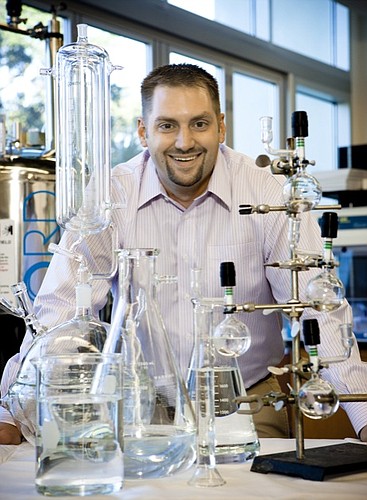- November 26, 2024
-
-
Loading

Loading

One might expect the process of making a medical discovery to look something like alchemy: constantly combining complex formulas, bubbling liquids changing color, an explosion here or there.
But Kevin Sill's eureka moment happened while reading a journal article published more than 70 years ago.
Sill, chief science officer for Intezyne, a Tampa-based biomedical research firm, found himself in the middle of a serious research bender. Twenty pages deep in Google search results, he had spent the past year reviewing piles of scientific journals.
He was looking for the final piece to the puzzle with Intezyne's co-founder and chief executive officer, Habib Skaff — a puzzle that could revolutionize cancer treatment.
Sill found that piece in a 1938 article published in the Journal of the American Chemical Society. Strangely enough, the article was about cough lozenges, not cancer treatments.
Regardless, the discovery put Intezyne on a path to have a lasting impact on medicine.
The company's innovation — the result of that eureka moment — aims to improve the effectiveness of chemotherapy. Ideally, the new drug will help limit the destructive impact of chemotherapy to only the patient's tumor, reducing negative side effects.
Already, the company claims the drug has significantly outperformed a similar drugs made by Pfizer in early tests, giving the company a major advantage.
As for its business model, Sill says Intezyne finds its small size and agility to be useful in responding quickly to important changes, be they market shifts or experimental results.
Says Sill, “We can complete a project before Johnson & Johnson decides to do one.” It's an advantage enjoyed by many small businesses in all types of industries — the ability to outmaneuver larger competitors.
However, owners of small businesses like those know that small size can also be a hindrance. What bigger companies lack in quickness, they often make up for in financial power.
It's a challenge Intezyne will have to deal with in the near future, as later stages of drug testing procedures for new drugs can cost hundreds of millions of dollars.
The company can likely carry its own product through the early phases of the process, but will eventually need a larger partner. “We just don't have the pockets,” Sill says.
The need highlights another important task for small businesses: networking.
It's networking that brought Intezyne to the Gulf Coast. The connection to the Tampa Bay area originates with the company's CEO, as Skaff studied at the University of Florida.
From there, Sill says relationships with local organizations like the University of South Florida have helped Intezyne succeed in the area. Those relationships have helped create the facility from which the company operates, the University's Research Park of Tampa Bay.
The available space in Research Park was a major selling point in bringing the company here. The arrangement the company reached with the University also covers Intezyne's electricity, internet and waste disposal costs.
The rent alone is significantly cheaper than the Boston area, an important comparison for Skaff and Sill, who did their graduate research at the University of Massachusetts before relocating to Florida's Gulf Coast.
In fact, the two had not yet obtained their doctorates before starting Intezyne. (They have done so since.) But now, after already obtaining more than $5 million in investment backing, the company is “chasing” additional investors at full speed, says Sill.
That task remains challenging. “This is a risky investment,” Sill admits. But for all that could go wrong with the drug's development, the potential results could have an enormous impact on the way cancer patients are treated — which of course would mean enormous profit potential for investors.
The stakes are high for Intezyne. Given the competitive nature of the pharmaceutical industry, Sill says his company has “one shot” to succeed.
That means to the mix of pharmaceutical researcher and business executive, you can add a big beaker of stress. But the potential outcome for Sill and his company is an improvement in cancer treatments and financial success.
— Alex Walsh